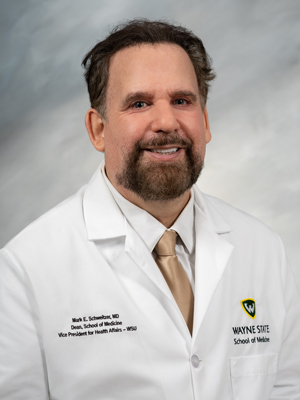The Wayne State University School of Medicine will offer an accelerated three-year medical degree program to incoming student applicants beginning in 2022.
Approved by the university’s Board of Governors on Oct. 1, the program is the only one of its kind in Michigan.
The program, said Mark E. Schweitzer, M.D., dean of the School of Medicine and vice president of WSU Health Affairs, will be available to mature new students who have previous health care backgrounds and careers.
The goals of the program include reducing student debt, further diversifying the student body while providing an avenue for more experienced students to accelerate training, retaining high-quality newly-minted physicians as residents in WSU residency programs, and eventually increasing the corps of physicians in Michigan, which faces a shortage of doctors.
The program will consist of a curriculum parallel to the traditional four-year education.

“This is an innovative way to allow a dedicated pathway for a certain type of student and link a residency with their medical school admissions, so they know in advance where they will finish the entirety of their training” Dean Schweitzer said. “There are several of these programs outside of Michigan, most focused on primary care, but the Wayne State program will include basically every medical specialty from ophthalmology to radiology.”
The WSU School of Medicine accepts 300 new medical students each year. Students accepted into the accelerated program will be selected from among those 300. The school anticipates placing up to 10 students in the three-year program in 2022, another 15 in 2023, and 20 in 2024 and 2025.
Other medical schools, including those at Duke University, Penn State, Ohio State University, University of California – Davis, the University of Wisconsin, New York University and Texas Tech University, offer accelerated three-year M.D. programs.
The Association of American Medical Colleges reported in 2019 that three-year medical degree graduates perform on par with graduates of traditional four-year programs.
Proponents of such three-year programs argue cutting the time in school – without sacrificing the education received – can significantly reduce the amount of education debt medical students incur. Researchers who compared the debt carried by graduates of three- and four-year programs found that those who completed school in three years saw a lifetime savings of about $250,000.
Students also would incur fewer expenses and endure less stress because they will have already been identified for placement in one of Wayne State University’s affiliated 12 residencies. Traditionally, students in four-year programs must travel the country interviewing for post-graduation residency programs.
When prospective students apply to the WSU School of Medicine, they will indicate their preference for the accelerated track. Once accepted, students opting for the three-year program will be interviewed by members of the residency program of the specialty they have selected. Those residency team members will determine if applicants meet acceptance criteria for the three-year program and the residency program.
Students in the three-year program will be required to meet the educational objectives and graduation requirements of the four-year track. They also will meet additional curricular requirements designed to provide career mentoring and advanced clinical skills. The overall curriculum time will exceed the Liaison Committee for Medical Education requirements of a minimum of 130 weeks in M.D. programs.
Each student in the three-year program will be assigned a faculty mentor within the student’s identified specialty upon beginning their medical education. They also will be assigned a clinical preceptor in their specialty as part of clinical skills courses during the pre-clerkship phase.
Three-year students must pass all coursework and medical examinations on the first attempt. Students failing to meet any standards set in the new program will move into the four-year program.